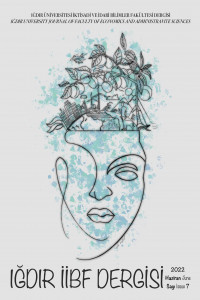Democratic Left: The Leading Discourse of the 1970s in Turkey
Bülent Ecevit, Democratic Left, CHP, İsmet İnönü, Kemalism
Democratic Left: The Leading Discourse of the 1970s in Turkey
Bülent Ecevit, Democratic Left, CHP, İsmet İnönü, Kemalism,
___
- Aydemir, Ş. S. (1971). “Ekonomik Yapı, Ekonomik Politik Değişmeler”. In Türkiye’nin Yapısal Analizi, (pp. 27-64). Ankara.
- Berkes, N. (2005). Türkiye’de Çağdaşlaşma, Istanbul: YKY.
- Boratav, K. (1983). Türkiye’de Popülizm: 1962-1978 Üzerine Bazı Notlar, Yapıt 1
- Cardoso F. H. (1982) Dependency and Development in Latin America. In: Alavi H., Shanin T. (eds) Introduction to the Sociology of “Developing Societies”. Palgrave, London.
- CHP. (1969). CHP’nin Düzen Değişikliği Programı, Ankara.
- CHP. (1973). Ak Günlere, Ankara: Cumhuriyet Halk Partisi.
- CHP. (1974). Başbakan Ecevit’le Sohbet, Ankara: CHP Tanıtma Komitesi Yayınları.
- CHP. (1976). Program, Ankara: Cumhuriyet Halk Partisi.
- Coşkun, A. (1978). Cumhuriyet Halk Partisi ve Demokratik Sol, Istanbul: Tekin Yayınları.
- Ecevit, B. (1968). Ortanın Solu, Ankara: Tekin Yayınevi.
- Ecevit, B. (1972). Perdeyi Kaldırıyorum. Ankara: Cumhuriyet Halk Partisi.
- Ecevit, B. (1973). Atatürk ve Devrimcilik, Istanbul: Tekin Yayınları.
- Ecevit, B. (1974). “Başbakan Bülent Ecevit’in Demokratik Sol Düşünce Forumunda Yaptığı Konuşma”. In Demokratik Sol Düşünce Forumu, (pp. 1-21). Ankara: CHP Gençlik Kolları Yayınları.
- Ecevit, B. (1975a). Demokratik Solda Temel Kavramlar. Ankara.
- Ecevit, B. (1975b). Demokratik Sol, Ankara: Cumhuriyet Halk Partisi.
- Ecevit, B. (1992). Neden ve Nasıl Demokratik Sol, Ankara: DSP Yayınları.
- Ecevit, B. (1993). Mithat Paşa ve Türk Ekonomisinin Tarihsel Süreci, Ankara: DSP Yayınları.
- Ecevit, B. (2005). “Türkiye’de Demokrasi”. Çankaya Üniversitesi Gündem, No. 20, (15-23)
- Erdoğan, N. (1998). “Demokratik Soldan Devrimci Yola: 1970’lerde Sol Popülizm Üzerine Notlar”, Toplum ve Bilim, No. 78, (pp. 22-37).
- Gülalp, H. (1998), “The Eurocentrism of Dependency Theory and Question of Authenticity: a View from Turkey” in Third World Quarterly, Vol 19, No 5.
- Karpat, K. (1991). “The Republican People’s Party: 1923-1945”. In M. Heper and J. Landau (eds.), Political Parties and Democracy in Turkey, (pp. 42-64). London: I. B Tauris.
- Koloğlu, O. (2001). Kim Bu Ecevit?, İstanbul: Boyut Kitapları.
- Konuralp, E. (2009). “Ecevit’s Conception of Nationalism: A Unique Position or a Syncretic Vision?” Master of Science Thesis, Ankara: Middle East Technical University.
- Konuralp, E. (2013). Ecevit ve Milliyetçilik. İstanbul: Togan.
- Laclau, E. (1977). Politics and Ideology in Marxist Theory. London: New Left Books.
- Tachau, F. (1991). “The Republican People’s Party, 1945-1980”. In In M. Heper and J. Landau (eds.), Political Parties and Democracy in Turkey, (pp. 99-107). London: I. B Tauris.
- ISSN: 2459-0584
- Yayın Aralığı: Yılda 2 Sayı
- Başlangıç: 2016
- Yayıncı: Iğdır Üniversitesi
Zorunlu Türk-Yunan Nüfus Mübadelesinin Etkileri Üzerine Bir Değerlendirme
Democratic Left: The Leading Discourse of the 1970s in Turkey
Kuzey Kafkasya Analizi: Gölgelenen Savaşlar
Book Review: Democratization: A Critical Introduction
An Analysis On the Authoritarian Nature of the Turkmenbashy Regime
